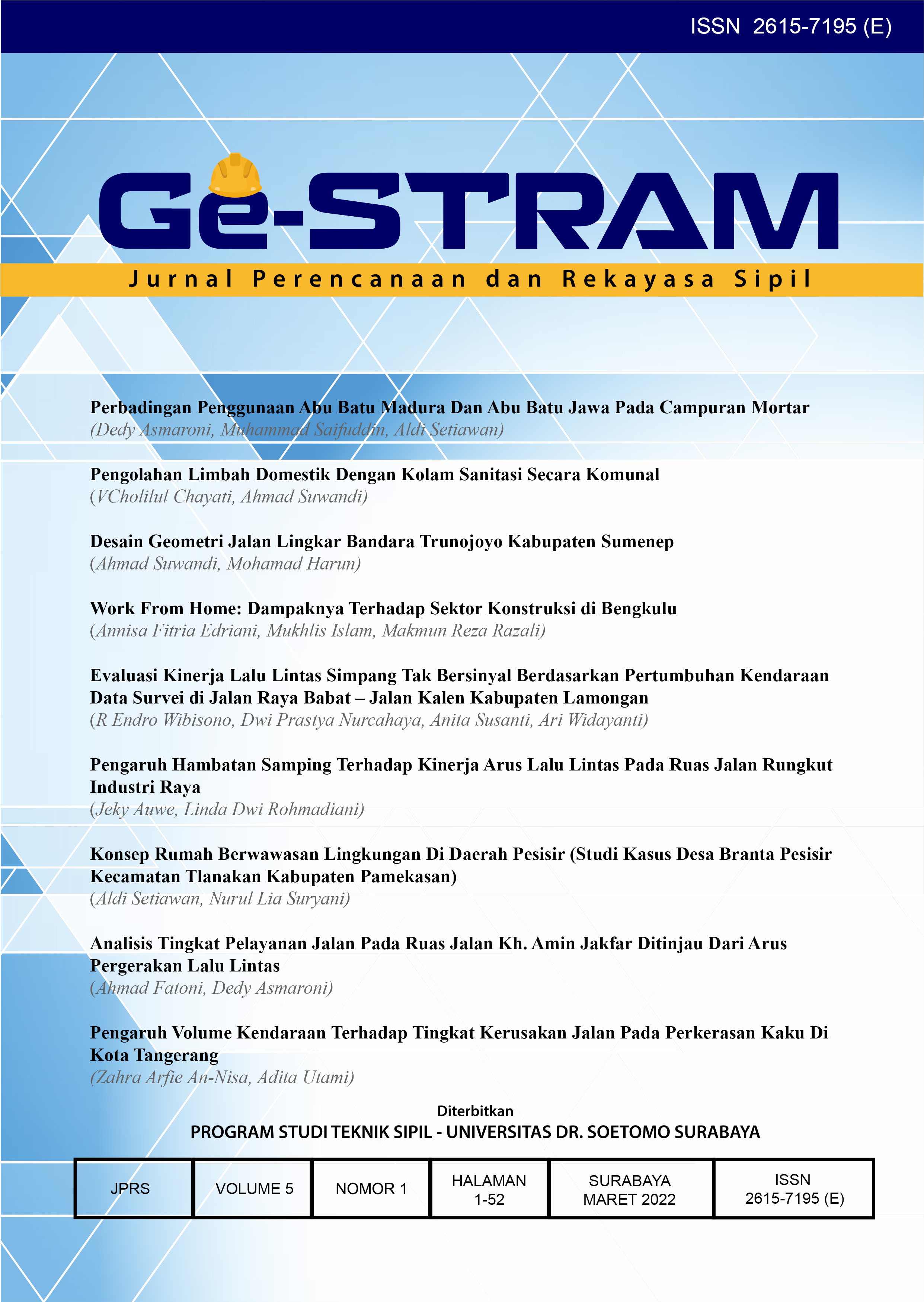Work From Home: Dampaknya Terhadap Sektor Konstruksi di Bengkulu
 Abstract views: 167
,
Abstract views: 167
,
 PDF downloads: 119
PDF downloads: 119
Abstract
Since the first COVID-19 case in Indonesia was announced on 2nd March 2020, the spread of COVID-19 has occurred so rapidly that Indonesia is listed as the country with the highest number of deaths in Southeast Asia. If humans limit interactions with each other, the process of human-to-human transmission can be suppressed until a solution or treatment can be found. For this reason, many countries have implemented work from home policies, restrictions on interaction between workers, and others. However, the authors have yet to meet research that focuses on the impact of the COVID-19 pandemic on activities in a construction project. Seven activities or stages common to construction projects are examined to determine whether the COVID-19 pandemic has had an impact on the implementation of these activities. From the research it is known that construction project activities affected by the COVID-19 pandemic are procurement activities, quantity surveying, and tenders because it takes time to adjust to the work from home rhythm. After workers are used to work from home, such activities tend to run well, as before the pandemic. Scheduling and implementation activities are impacted on several projects. Non-vital projects and private projects experienced delays and shifting of project completion dates due to lockdown regulations that limit the number of workers and delay delivery of materials
References
Al Amri, T., & Marey-Perez, M. (2020). Impact of Covid-19 on Oman's Construction Industry. Technium Soc. Sci. J., 9, 661.
Arnab, R. (2017). Survey sampling theory and applications. Academic Press.
Cox, N. (2020). New Zealand and Covid-19: a swift and firm response. The Round Table, 1-2.
de la Espriella, R., & Restrepo, C. G. (2020). Grounded theory. Revista Colombiana de PsiquiatrÃa (English ed.).
Khanna, R., Murnane, T., Kumar, S., Rolfe, T., Dimitrieski, S., McKeown, M., ... & Gandhi, C. (2020). Making working from home work: reflections on adapting to change. Australasian Psychiatry, 28(5), 504-507.
Ogden, R. S. (2020). The passage of time during the UK Covid-19 lockdown. Plos one, 15(7), e0235871.
Ogunnusi, M., Hamma-Adama, M., Salman, H., & Kouider, T. (2020). COVID-19 pandemic: the effects and prospects
in the construction industry. International journal of real estate studies, 14(Special Issue 2).
Qian, M., & Jiang, J. (2020). COVID-19 and social distancing. Zeitschrift Fur Gesundheitswissenschaften, 1.
Setiati, S., & Azwar, M. K. (2020). COVID-19 and Indonesia. Acta Medica Indonesiana, 52(1), 84-89.
Vartolomei, B. O. T. (2020). Considerations Regarding Work from Home and Telework. In Proceedings of the International Conference on Business Excellence (Vol. 14, No. 1, pp. 1217-1221). Sciendo.
Waizenegger, L., McKenna, B., Cai, W., & Bendz, T. (2020). An affordance perspective of team collaboration and enforced working from home during COVID-19. European Journal of Information Systems, 29(4), 429-442.
Copyright (c) 2022 Annisa Fitria Edriani, Mukhlis Islam, Makmun Reza Razali

This work is licensed under a Creative Commons Attribution-ShareAlike 4.0 International License.
Authors who publish with this journal agree to the following terms:
- Authors retain copyright and grant the journal right of first publication with the work simultaneously licensed under a Creative Commons Attribution-ShareAlike 4.0 International License that allows others to share the work with an acknowledgement of the work's authorship and initial publication in this journal.
- Authors are able to enter into separate, additional contractual arrangements for the non-exclusive distribution of the journal's published version of the work (e.g., post it to an institutional repository or publish it in a book), with an acknowledgement of its initial publication in this journal.
- Authors are permitted and encouraged to post their work online (e.g., in institutional repositories or on their website) prior to and during the submission process, as it can lead to productive exchanges, as well as earlier and greater citation of published work (See The Effect of Open Access).

This work is licensed under a Creative Commons Attribution-ShareAlike 4.0 International License.















